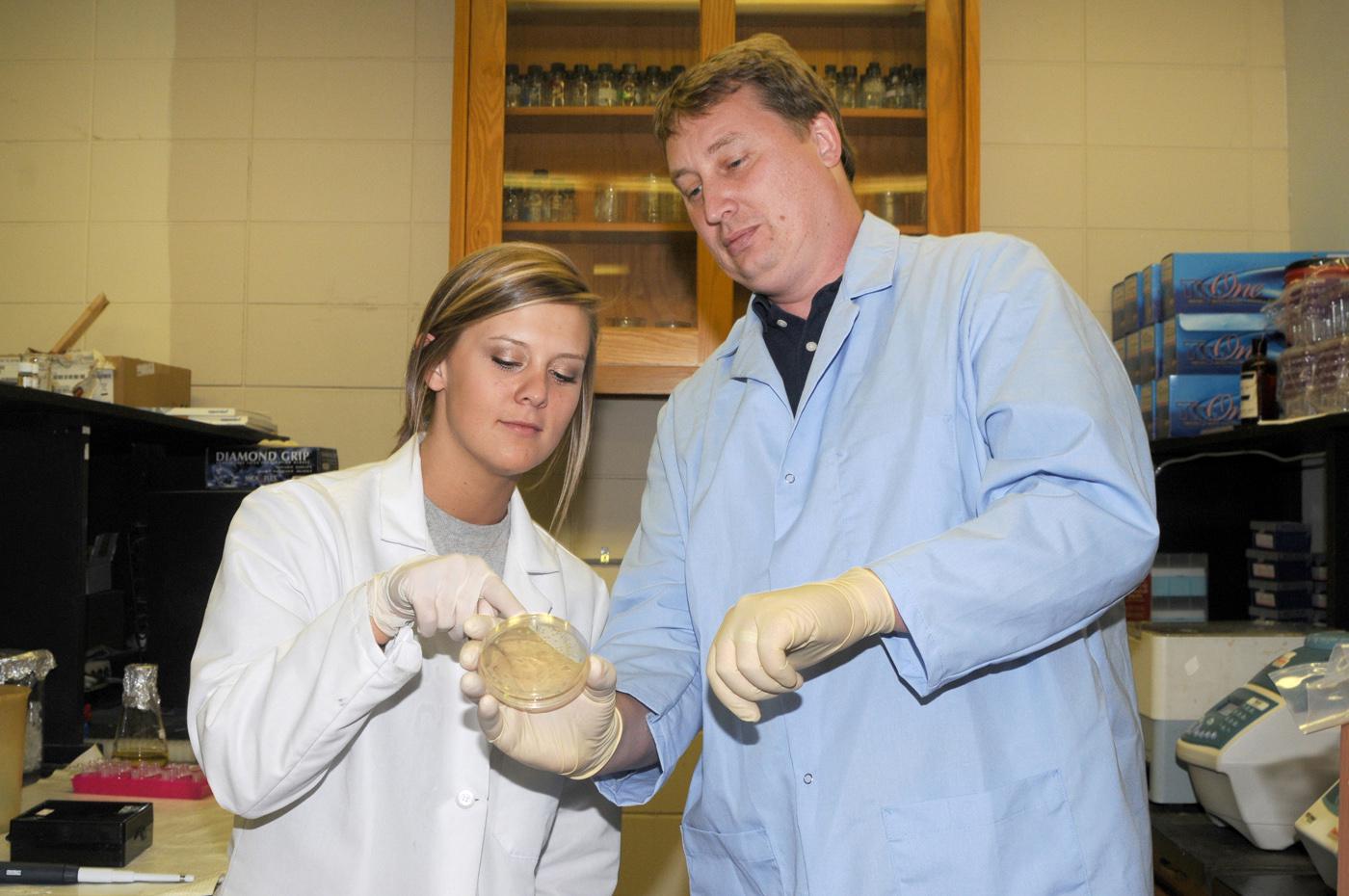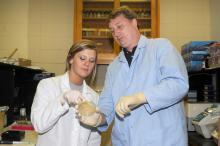Information Possibly Outdated
The information presented on this page was originally released on April 7, 2011. It may not be outdated, but please search our site for more current information. If you plan to quote or reference this information in a publication, please check with the Extension specialist or author before proceeding.
New research to aid state's soybean growers
By Karen Templeton
MSU Ag Communications
MISSISSIPPI STATE – Tiny soybean cyst nematodes cause big problems for soybean growers, but a Mississippi State University researcher is helping cut them down to size.
The soybean cyst nematode, or SCN, is a small, plant-parasitic roundworm that attacks the roots of soybeans. Affected plants have stunted growth, wilt and often die. SCN has been a problem for Mississippi growers since the 1950s, and there is no known method of eliminating nematodes from the soil. Growers rely heavily on crop rotation and other farm management techniques to minimize damage.
The dilemma has researchers interested in developing new soybean varieties.
Vincent Klink, assistant professor of biological sciences at MSU, has been studying how soybean plants react to nematode infection with the goal of developing a resistant variety.
“It’s a matter of what genes are ‘turned on’ to fight a nematode infection,” Klink said. “Once we know what genes are involved in an infection or resistance to SCN, we can place them into a plant, making a variety that is resistant.”
Klink first infects soybean plants with SCN and then cuts individual cells from the plants with a laser beam. Under a microscope, Klink can see what genes are playing a part in fighting the nematode. Klink plugs the data into a computer program to get a list of useful genes.
“We then engineer those genes into a plant and infect the new plant with SCN,” Klink said. “We compare those plants fighting an infection with the engineered gene to plants without the gene.”
It could be a few years before the new varieties Klink is developing will be fully tested and commercially available, but he also is working on other research that can assist farmers with current crop rotation techniques.
There are 16 types of SCN, commonly called “races.” These races differ in their ability to reproduce on certain soybean varieties. Many fields have more than one SCN race in them. One race may be dominant with other minor races present. SCN can change races, depending on the available food sources. Therefore, growers must test their soil before planting in order to choose varieties that are not susceptible to the particular nematodes in their fields.
“Typically, an SCN race test takes approximately 100 days,” said Clarissa Babalian, MSU’s plant pathology diagnostic lab manager. “The testing process requires using the cysts extracted from the soil to inoculate susceptible soybean varieties in the greenhouse. The nematode population increases on these susceptible varieties and then the nematodes are transferred to a number of standard varieties that are susceptible to specific SCN races.”
After the races are identified, Babalian and her colleagues provide recommendations to growers about what soybean varieties to plant.
Klink, in collaboration with Gary Lawrence, an associate professor in the MSU’s Department of Entomology and Plant Pathology, is working on reducing the number of steps and the amount of time involved in the testing process.
“A whole growing season can go by before growers know what SCN races they have in their soil,” Klink said. “To streamline the process, we are basically extracting DNA from the soil to test for specific nematode races. The DNA is actually coming from all of the nematodes that are in the soil samples, shortening the testing time.”
The new test uses a gene marker technique that can identify nematode races in a molecular laboratory in a matter of hours.
“The test that Dr. Klink and Dr. Lawrence are developing can help us offer yet another service to growers,” Babalian said. “They would have the time to test their soil more frequently to monitor for the changing race populations.”
Enthusiasm for the work is growing, and the Mississippi Soybean Promotion Board is funding the research projects.
“This is some of the most exciting research we’ve heard of in a long time,” said Keith Morton, MSPB member and soybean grower. “We’re farmers facing issues, and we depend on the work researchers do to help us out.”
Soybean farmers like Morton, who with his wife, Beth, owns Morton Farms, Inc., are excited about the new possibilities Klink's tests offer.
“The state is facing millions of dollars in losses because of SCN. On average, we test every 3 to 5 years to remain familiar with the SCN races we have in our fields,” Morton said. “Shorter testing times and resistant varieties are going to be a big help to our industry. We look forward to what the research brings.”
Contact: Dr. Vincent Klink, (662) 325-4577








